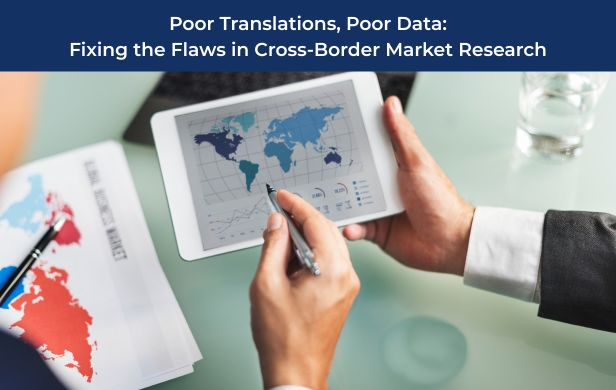
With globalization, businesses are no longer limited to serving just local customers. Companies looking to expand their reach and explore new customer bases rely heavily on market research to make informed decisions. However, when your market research crosses borders, it faces a unique challenge: language. Poor translations can lead to flawed data, skewed insights, and ultimately, bad business decisions.
In this blog post, we'll dive into why accurate translation and localization are critical to cross-border market research and how companies can fix common pitfalls to ensure reliable results. Call us at +91 8237060559 to get expert support for your market research translation needs.
Conducting market research in a single country can be straightforward. For instance, for respondents speaking the same language, cultural nuances are well understood, and the research instruments (surveys, focus groups, interviews) can be tailored accordingly. However, when the research expands to multiple countries with different languages and cultures, the complexity multiplies.
Market research depends on gathering honest, accurate responses to questions designed to capture customer preferences, perceptions, and behaviors. If the survey questions, interview guides, or focus group materials are poorly translated, the entire foundation of your research can crumble.
Poor translations don’t just create awkward wording—they can fundamentally change the meaning of questions or response options. Picture a scenario where a survey question is mistranslated, making it confusing or misleading. Respondents might answer based on their misunderstanding, and the resulting data will be inaccurate.
When these issues occur, the data collected can no longer be trusted as a valid reflection of the market. Businesses might make costly decisions based on false insights, such as misjudging product demand or misinterpreting brand perception.
1. Invest in Professional Market Research Translation
It’s tempting to use automated translation tools or rely on bilingual employees to translate research materials, but these shortcuts often backfire. Professional translation agencies, especially those with expertise in market research, understand that this field requires more than literal word-for-word translation. They specialize in conveying the exact intent and tone of research questions.
At the heart of effective market research translation is transcreation—the process of adapting content not just linguistically but also culturally to preserve meaning and emotional impact.
2. Use Native Translators Familiar with Market Research
Translators should be target language natives and ideally have experience or training in market research. They understand the terminology, survey conventions, and cultural nuances that impact how questions are interpreted. Native market research translators can anticipate potential misunderstanding and flag problematic phrases before the research goes live.
3. Conduct Back-Translation and Review
Back-translation is a quality control step where translated content is translated back into the original language by a different translator. This helps identify discrepancies, mistranslations, or ambiguous language. Combined with reviews by research experts, this process ensures that the final survey or interview guide accurately reflects the original intent.
Accurate, culturally relevant translations don’t just improve the respondent experience but preserve the integrity of the data itself. Market research data is only as good as the questions asked and understood. By eliminating translation errors, businesses can trust their data to reflect true market conditions, consumer sentiments, and preferences.
With reliable data, companies can:
In short, fixing the flaws in translation leads to better research, smarter business decisions, and ultimately, greater cross-border success.
Despite best practices, several challenges remain in cross-border market research translation:
Partnering with an experienced language service provider can help navigate these challenges through expert project management, scalability, and technical know-how.
When it comes to ensuring your cross-border market research delivers accurate, actionable insights, Language Services Bureau is your trusted partner. We specialize in providing expert translation and localization services tailored specifically for the market research industry. Here’s why leading brands choose us:
With Language Services Bureau on your side, you can be confident that your market research reflects the true voice of your target audience, no matter where they are in the world.
Cross-border market research holds immense potential for businesses seeking growth beyond their domestic markets. However, poor translations can undermine that potential, leading to flawed data and misguided decisions. By investing in professional translation, localization, and quality control, companies can fix these flaws and achieve the full value of their research efforts.
If you want your cross-border market research to deliver reliable, actionable insights that drive success, partner with Language Services Bureau today!